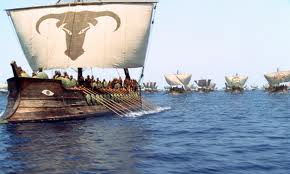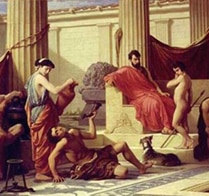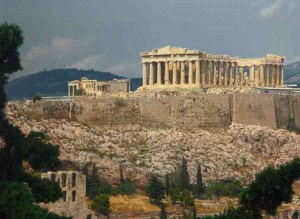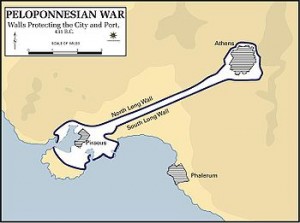Aftermath of the War: 480-477
- Thessaly, Macedonia sided with Persia, not all the Greeks resisted

- What did the Greek who won want to do with all the land along the Aegean
- Sparta was the leader, everyone looked to them, they were the strategist
- Spartans were sort of sluggish, never thought about establishing an empire, very dedicated but never too ambitious
- Spartans forced evacuation on the Ionians
- Spartans kept the Greek fleet, the ships from all over the different poleis and decided to attack Persians while they were weak
- This dictation kind of rule sparked discontent amongst the poleis, and they looked for someone else other than Sparta for leadership
- Pausanias was behaving radically, wearing purple (kingly colour), demanded worship etc, ephors took him home. This is someone who just snapped under the pressure of Spartan glory and honour
- Spartan culture didn’t have mediation, negotiation
- The rest of Greek turned to Athens, very forward making, daring, innovative polis, unlike the Spartan, they knew a lot about naval enterprises (sea power), that’s what you needed to protect Ionia
- Rest of Greece sympathized for Athens, tragic, noble hero that emerged from Persian War, their city got burned to the ground twice, lots of goodwill
- Athens decided to create a league, “a network of poleis to compensate ourselves for our losses by ravaging territory from the King of Persia.”
- If you wanted to join, based on the size of your poleis, contribute ships or money and it was optional to any polis
Delian League: 477
- Central idea of having a defensive league

- All the poleis who could immediately be attacked by Perisa were part of the League, treasury was in Delos (neutral area) not in Athens
- Kept track of how many ships and what contributions each polis made
- Themistocles: very powerful, organizers of this Delian League, Spartans worked against him but got too powerful was ostracized from Athens
- Drove the Persian navy not only out of Ionian but further east, there was a civil war back home at Persia too
- Incredibly successful , the loot that came out of the expeditions compensated all their contributions
- Cimon, Spartans tried to rival him against Themistocles, he worked as a proxenos between the two states, he adored Sparta a lot and lost popularity, eventually was ostracized as well
- Established as a strong naval power after the war, Athens set up Delian League under the leadership of Aristides, extending Athens influence
- The league consisted of the poleis all along both sides of the Aegean
- When poleis wanted to secede, Athens would confiscate fleet and defensive walls, it soon became an empire when treasury moved from Delos to Athens
- It evolved from defense against an external threat but also to secure democratic constitutions against oligarchic predecessors
- Formed (forced alliances) with Argos and Megara along the isthmus, a strategic location but couldn’t sustain power on land against Spartans
- After 15 years of intermittent conflicts, 30 years peace contract signed, gave up their ambitions in return for Sparta’s recognition of their naval hegemony
- Since Cleisthenes, much internal change, moved towards radical democracy, archons (form of executive government) expanded to be elected not only from first class citizens but from second and third class curtailing the power of aristocratic families, broadening democratic base
- Ephialtes supported by Pericles further reduced privileges and powers of the Aeropagus (ex-archons) who held office for life, mostly aristocrats
- Jurisdiction over all cases except homicide transferred into public courts, Pericles also introduced paid jury service, encouraged less wealthy
- Ekklesia: the assembly of all male citizens, business put forth by the boule: council of 500 (age 30+), no one could serve
 more than twice a lifetime
more than twice a lifetime - Year split into prytany (36 days): council split into 10 groups of 50 presiding a prytany each, small group to pay, met everyday
- Take vote of confidence on the officials then serving, oversee arrangement for corn supply, and defense for state
- “who wishes to speak to the assembly?” presenting matters, council executes
- Democracy focused on rotation and sortition (spreading) of power
- Pericles until his death lent his name to the whole era, high-water mark of Athenian power and influence, nicknamed Olympian because of aloofness
- Born an aristocrat but pushed for democratic reform, power stemmed from ability to control assembly by virtue of his oratory (public speaking)
- Elected general on an annual basis, ostracizing his enemy
- Proposing the rebuilding of the city of Athens after being burned down by the Persians, rebuilt temples, freedom of the seas, general peace
- Negotiated 30 years of peace, Athens as a naval hegemony, put down attempts of poleis trying to secede from league, expanded empire, establishing colonies in some existing states
- Thucydides: “take pride in Athenian empire, take on burdens as well, your empire is like a tyranny, wrong to take it, dangerous to let it go”
- Successful politician, cultivated man, under his rule Athens became cultural centre of the Greek world, home to visiting intellectuals and artists
- Socrates began his mission in the Periclean Athens, also the Parthenon was part of a grand program of public building
- Periciles: speech dedicated to dead Athens during Peloponnesian War, stressing democratic constitution, Athenian love of beauty and philosophy, equality before the law, absolute recognition of merit, culture pre-eminence, and dedication of the individual to the community
- “education to Greece…show himself the rightful lord and owner of his own person and so this moreover with exceptional grace and versatility.”
Athenian Empire: 469-445
- Certain poleis started to think about disbanding the Delian League because the Persians were driven out, they wanted to leave

- Sparta said it should be shared among all the poleis, demanded that all the poleis joined, it was a public benefit, every poleis got some share of the loot but Athens got the majority of it but their city was destroyed
- After a while, after the Persians have retreated, Athens still required the poleis to pay taxes and it become insufferable to other poleis
- It’s becoming an empire
- Athens then moved the treasury over to Athens and said no need to give ships, just contribute money, it becomes Athenian’s private possession
- It was not only dictating but meddling with other poleis, they favoured democratic poleis, had troubles with poleis that were aristocratic, monarchs
- I.e. new harbour, new jobs, wealth, ports, prosperity and benefits, built it in democracy poleis, nudged their allies toward democracy
- If the poleis became a democracy Athens would treat them better (lower tax)
- Sparta was a fearful, undefeatable power, but not power-hungry
- Athens becomes more ambitious, turning the entire region into the Delian league and starts approaching poleis in mainland Greece
- Megara: tiny polis in mainland Greece, Athens asked them to join, Megara refused, reasoning that they were an ally of Corinth (Peloponnesian)
- Therefore Athens ordered that all poleis must boycott Megara, no trade or business with them. Megara was a merchant poleis, they suffered deeply, eventually giving in becoming an ally
- This alarmed the mainland Greeks
- With Sparta minding their own business, and Athens in power they decided to expand south, possible incorporate Egypt and Cyprus into their empire
- This is almost like a tragic, the fleet they sent was destroyed by a storm, they were stranded and captured
- Insanely confident, then it turns on them and they’re fatally defeated
- Corinth: resented Athens, finally persuaded Sparta to attack Athens
- In a period of about ~35 years, Athens had become so aggressive, so fearful that Corinth persuaded Sparta to declare war on Athens, Persia joined sides with them
- After failure of Egypt expedition, Athens was very vulnerable
- Sparta’s offer: get rid of the empire, or else it’s war, and they ended up declaring war, Athens stalled negotiations
- Rest of Greece always thought, once Sparta decided to fight, it’s over, in an equal battle, they are truly invincible, just confront the Athenians
- Took years of negotiating, but Sparta refuses to attack, it’s their allieis
- During the years of negotiation, Athens fortified their walls, they connected to their walls a long highway to the nearest port, surround the port with walls, turning Athens from an in-land poleis to an island
- They would have food, resources shipped through the highway
- Sparta could surround Athens as long as they like, only way to stop Athens’ food source was by sea, and in a naval battle, Sparta didn’t stand a chance
- Spartans were experts fighting with shields, they didn’t have siege towers
- Athens promises not to meddle with mainland Greece, but restrain to what they have now, content with current Delian League (30 years peace)
- Sparta agreed with truce, Persian King also declared peace (445)
- Athens kept the walls up, key stone to defence
The Long Walls: ’30 yrs. peace’
- Pericles: came up with the Long Walls idea

- Population more than doubled in the Delian League region, along the Aegean
- Golden time to be a merchant, it’s safe, all ports connected, certain people are doing very well under the Athenian rule (the middle class)
- Aristocrats didn’t like it very much, weren’t too involved in the “bustling” business, also good for the lower class, lots of jobs (e.g. rower of the ships)
- People didn’t think it would last, thought it was be eventual war
- Athens kept fortifying walls, trying to defend themselves
- Corcyra: way in the west, removed from the rest, it was a colony of Corinth, colonies were to avoid overpopulation, and many Corinthians lived in Corcyra years before. There were the liberals who wanted victory, took control of the government. The conservatives who were connected to certain people in Corinth, asked for help, it’s unconstitutional, the election is rigged. Corinth sent ships to maintain civil peace
- Second election took place, conservatives won, the liberals appealed to Athens to ask to help keep peace
- Athenian ships sailed up, but it involved into a small naval battle, Corinthian ships were sunk, third election, liberals won, and they put their political opponents on exile, all fleeing to Corinth
- Corcyra now becomes ally of Athens
- Corinthians claimed that Athens had violated the truce, meddling in Corcyra, message to Athens, Sparta demanded they dissolve the empire or it’s war
- Potidaea: also a Corinthian colony and Athens questioned their loyalty hence preventing revolts that were sparked by the Macedonians in the north and ordering Potidaea to tear down all their walls of fortification but still defending them
- Corinthian officials also kicked out, angering Corinth who sent troops over to the city, and Athens defeated them
- Athens then besieged Potidaea for Athenian treasury and that was the end of any Corinth, Athenian relationship
- Peloponnesian War broke out soon afterwards
